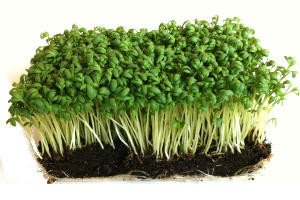Contents
Uses
- Coughs
- Vitamin C deficiency
- Constipation
- Water retention
- Strengthening the immune system
Benefits
- Potential Anti-Cancer Effects
A study funded by Australia’s Rural Industries Research and Development Corporation (RIRDC) assessed the anti-cancer potential of a number of Brassica vegetables, including garden cress.Despite containing ESP, garden cress still had significant anti-cancer potential relative to many other vegetables tested. - Good for Your Vision
By eating just one ounce of garden cress you will be supplying your body with nearly 40% of the Daily Value of vitamin A (in the form of carotenoids). As you may already know, vitamin A and carotenoids are considered one of the best nutrients for the eyes due to their ability to reduce the risk of impaired night vision, cataracts, retinitis pigmentosa, and even age-related macular degeneration, a common cause of blindness in older people.
- More Vitamin C Than Oranges
Fresh garden cress contains much more vitamin C than fresh oranges! Just one ounce of garden cress delivers a whopping 32 of the Daily Value of vitamin C – that is 7% more than what you would get from an equal amount of fresh orange. Vitamin C is crucial to keeping you skin, bones, and gums strong and healthy, but it also helps prevent iron deficiency by improving your body’s capability to absorb iron from foods.
- Cardiovascular Benefits
Scientific research suggests that vitamin C may also help keep your cardiovascular system healthy.
In addition, garden cress is supercharged with vitamin K, another nutrient that is thought to play a key role in maintaining cardiovascular health. By adding just half an ounce of garden cress to your salad you will be covering almost 100% of the Daily Value of vitamin K!
Cautions
- Pregnancy and breast-feeding: There is not enough reliable information about the safety of taking garden cress if you are pregnant or breast-feeding. Stay on the safe side and avoid use.
- Diabetes: Garden cress might lower blood sugar levels in people with diabetes. Therefore, blood sugar levels need to be monitored closely. Dose adjustments may be necessary for diabetes medications that are taken.
- Low potassium levels (hypokalemia): Garden cress might flush potassium out of the body, possibly leading to potassium levels that are too low. Until more is known, use garden cress with caution if you are at risk for potassium deficiency.
- Low blood pressure (hypotension): Garden cress might lower blood pressure. There is some concern that garden cress might interfere with blood pressure control in people prone to low blood pressure.
- Surgery: Garden cress might lower blood sugar levels. There is a concern that it could interfere with blood sugar control during and after surgical procedures. Stop taking garden cress at least 2 weeks before a scheduled surgery.
Interactions
We currently have no information for garden cress Interactions
Other Names
Garden cress, Berro Hortelano, Cresson Alénois, Cresson de Jardin, Lepidio, Lepidium sativum, Mastuerzo
References
Heal with Food, http://www.healwithfood.org/health-benefits/garden-cress-nutritional-benefits.php#ixzz3fraRwWBr

